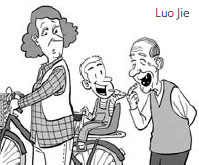Wresting control from my bilingual meter-high master
By Debbie Mason ( China Daily ) Updated: 2009-03-25 09:50:11After ten minutes on the sidelines stamping my feet with the cold, I heard myself whine, "I'm freezing, can we go home now?"

"In a minute, I'm just talking," chided my meter-high master.
A week later, I picked him up on my bike. We passed a classmate of his, who is collected every day by her grandparents. On this particular day, Granddad had been too busy to come, so it was just Grandma.
I was just about to call out to the little girl, "See you tomorrow!" when a voice rang out from the child seat behind.
"Her grandfather hasn't come to pick her up today then?"
He didn't address his own peer, it was Grandma he spoke to, who simply answered: "No, he hasn't come today."
The incredible thing about this, to me, was the way he knew exactly how a Chinese greeting would be made. It would not have occurred to me to say it, although stating the obvious is often a polite form of greeting, for example, "Come back then?" when it's obvious you have just returned home.
My 4-year-old knows this better than me, someone who has lived in China for twice the length of his lifespan.
Last week, a toothless old man smiled at him in a park.
"What happened to your teeth?" immediately piped up my little boy.
"Oh, they just fell out," said the old man, with no trace of embarrassment or offence.
If a Western child had said that to a Western old man, his mother would have scolded him furiously for being rude, but on this occasion my son had already worked out that as he meant no offence, the old man wouldn't take any.
This ability to communicate completely naturally is something I will never have as a learner of Chinese, no matter how perfect my tones become or how flawless my grammar.
I started feeling quite grumpy about this talent as we reached the door of our home. Then suddenly: "Mummy I can't open the door, and I'm hungry, and I want some milk, and I'm tired, can I have a lollipop?"
Thank goodness. At least between us, I still have the power.
|
|
|
|
|
|
|
|


























 Raymond Zhou:
Raymond Zhou: Pauline D Loh:
Pauline D Loh: Hot Pot
Hot Pot Eco China
Eco China China Dream
China Dream China Face
China Face






